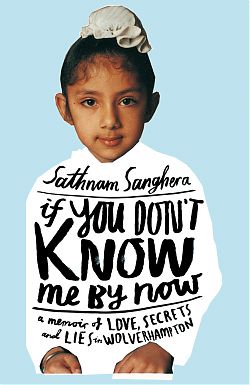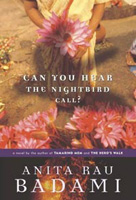
For anyone in the D.C. area interested in Jhumpa Lahiri’s writing- she is on a book tour and will be speaking at Sixth & I on Wednesday, April 23 at 7 pm.
 Tickets are available at Politics & Prose for $6 or you can buy the book for $25 and get 2 free tickets with it. Contact P & P at 202. 364. 1919.
Tickets are available at Politics & Prose for $6 or you can buy the book for $25 and get 2 free tickets with it. Contact P & P at 202. 364. 1919.
Jhumpa Lahiri’s stories about the Indian-American diaspora vividly evoke both the ambivalence of the older generation – appreciating their adopted nation, but feeling dislocated – and the freedom of the younger generation, unfettered by their South Asian origins, except for parental expectations. Lahiri won the Pulitzer Prize for The Interpreter of Maladies, and her second novel, The Namesake, was adapted to a film in 2007.
A little more info: Lahiri’s new collection of stories (as well as her older works) elegantly capture the way we navigate dual cultures.
Assimilation, in Lahiri’s fiction, is about coming to terms with disorientation. It is about not fitting in or settling down, not starting over from scratch and freely forging a new identity or destiny. Her characters balance precariously between two worlds—not just Asian and Western, but inner and outer…
When an author chooses to write a memoir, they take the risk of unveiling a plethora of secrets that otherwise (and perhaps preferably) would remain buried. And when that author is Punjabi Sikh, it is almost guaranteed that issues will be brought up that make people uncomfortable.  For our parents’ generation, secrets remain in the family and they are never discussed in public – we are raised to uphold the family izzat (honor). But at what cost do we remain quiet? A new memoir by Sathnam Sanghera, If You Don’t Know Me By Now: A Memoir of Love, Secrets and Lies in Wolverhamptom, opens up the dialogue around being raised in a working-class Punjabi immigrant family and being a child living in a family paralyzed by schizophrenia. Some of these experiences can be felt universally throughout the Panjabi community and others are more personal, but what is clear is that there is a great need in our community to dialogue about these issues.
For our parents’ generation, secrets remain in the family and they are never discussed in public – we are raised to uphold the family izzat (honor). But at what cost do we remain quiet? A new memoir by Sathnam Sanghera, If You Don’t Know Me By Now: A Memoir of Love, Secrets and Lies in Wolverhamptom, opens up the dialogue around being raised in a working-class Punjabi immigrant family and being a child living in a family paralyzed by schizophrenia. Some of these experiences can be felt universally throughout the Panjabi community and others are more personal, but what is clear is that there is a great need in our community to dialogue about these issues.
I clutched my schoolbag tightly as I walked along with Dad, as if my life and dignity depended on its contents (which, in a way, they did), mumbled the Japji Sahib, the beginning of the Guru Granth Sahib Mum had taught me, and watched Dad hum to himself – Hindi songs I didn’t recognise from Bollywood films I’d never seen – click his fingers to some beat I couldn’t hear, and smile, at people going past, at nothing in particular. [Link]
While I haven’t yet read the memoir (it is being released in March), several articles discuss his story at length. It wasn’t until he was in his twenties that Sanghera realized his father was a paranoid schizophrenic and his older sister also shared the condition. Intermingled within that tale is Sanghera’s own story of being a young Sikh boy growing up in Wolverhampton (one of the most densely populated Sikh communities in the UK).
Love lost, love gained, and love yearned for … HAPPY VALENTINE’S DAY!
 Some of the first things that comes to my mind when thinking about Valentine’s Day are thoughts of carnations, roses, scobby-doo miniature valentine day cards, and those sugary heart candies with statements like “Be Mine” and “Page Me”. With the “expression-of-affection- through-consumption” aspect of of Love Day aside, let’s take this time to think about the idea of love. As I think about the depth, significance, and longevity of the emotion and meaningfulness of love … thoughts of Heer/Ranjha, Sohni/Mahiwaal, shyaari (poems) by Shiv Kumar Batalvi, and Guru Nanak Dev Ji’s love poetry come to mind. These works share the complications, nuances, selfishness, self-lessness, and spirituality of love.
Some of the first things that comes to my mind when thinking about Valentine’s Day are thoughts of carnations, roses, scobby-doo miniature valentine day cards, and those sugary heart candies with statements like “Be Mine” and “Page Me”. With the “expression-of-affection- through-consumption” aspect of of Love Day aside, let’s take this time to think about the idea of love. As I think about the depth, significance, and longevity of the emotion and meaningfulness of love … thoughts of Heer/Ranjha, Sohni/Mahiwaal, shyaari (poems) by Shiv Kumar Batalvi, and Guru Nanak Dev Ji’s love poetry come to mind. These works share the complications, nuances, selfishness, self-lessness, and spirituality of love.
 Even though the ending in some of these works is not “happily-every-after”, I think beauty lies in the process and meaning of their love … how their actions expressed it … not so much the outcome! Let’s take Love Day to think and appreciate the expression of love in Punjabi and Sikh literature !
Even though the ending in some of these works is not “happily-every-after”, I think beauty lies in the process and meaning of their love … how their actions expressed it … not so much the outcome! Let’s take Love Day to think and appreciate the expression of love in Punjabi and Sikh literature !
Dedicated to “The man on the bridge in Modinagar and the victims of Air India Flight 182,” Can You Hear the Nightbird Call?, is said to be one of the recommended reads for Sikhs everywhere. While there are numerous historical accounts of the Partition, Operation Bluestar, and the Delhi riots – this is one of the few fictional accounts I have come across where the same feeling and emotions rise to the surface as they do when we think back to those events.
The author, Anita Rau Badami recalls,
[It was] just after Indira Gandhi was assassinated by two of her Sikh bodyguards. I’d been married two weeks. My husband and I were traveling back to Delhi after our honeymoon. In Modingar, a town close to Delhi, we saw a Sikh man standing on a bridge… his turban removed, his long hair unbound, his arms pinned to his sides by a car tire, surrounded by a group of hoodlums. Somebody tossed something at him and the next moment the man was on fire. [Link]
 This event is the seed for the novel. The story spans over half a century, from the Partition in 1947 to the Delhi riots following the events of 1984 and finally to the explosion of the Air India flight in 1985. It’s the story of the intersection between personal concerns and larger ethical and political ones. Bibiji, Nimmo, and Leela are the three main characters of the novel – three women whose lives merge and diverge by chance yet are linked through the political turmoil and destruction in Panjab, first during the 1947 partition and then again during the events of 1984. Bibiji grows up in Panjab and as a teenager manages to steal her sister’s husband-to-be and moves with him to Vancouver. Leela, a half-German woman from Banglore, also follows her husband to Vancouver and befriends Bibiji. Nimmo, my favorite character, remains in Delhi and is a direct witness to the partition. She is also Bibiji’s niece and in a twist of fate, she reluctantly agrees to send her oldest son, Jasbeer, to live with Bibiji in Canada. It’s a heartbreaking decision that Nimmo will come to regret. Interestingly, Badami’s three heroines were partly inspired by a collection of survivors’ testimonies published by People’s Union for Democratic Rights in 1984 about the impact of the Delhi riots.
This event is the seed for the novel. The story spans over half a century, from the Partition in 1947 to the Delhi riots following the events of 1984 and finally to the explosion of the Air India flight in 1985. It’s the story of the intersection between personal concerns and larger ethical and political ones. Bibiji, Nimmo, and Leela are the three main characters of the novel – three women whose lives merge and diverge by chance yet are linked through the political turmoil and destruction in Panjab, first during the 1947 partition and then again during the events of 1984. Bibiji grows up in Panjab and as a teenager manages to steal her sister’s husband-to-be and moves with him to Vancouver. Leela, a half-German woman from Banglore, also follows her husband to Vancouver and befriends Bibiji. Nimmo, my favorite character, remains in Delhi and is a direct witness to the partition. She is also Bibiji’s niece and in a twist of fate, she reluctantly agrees to send her oldest son, Jasbeer, to live with Bibiji in Canada. It’s a heartbreaking decision that Nimmo will come to regret. Interestingly, Badami’s three heroines were partly inspired by a collection of survivors’ testimonies published by People’s Union for Democratic Rights in 1984 about the impact of the Delhi riots.
